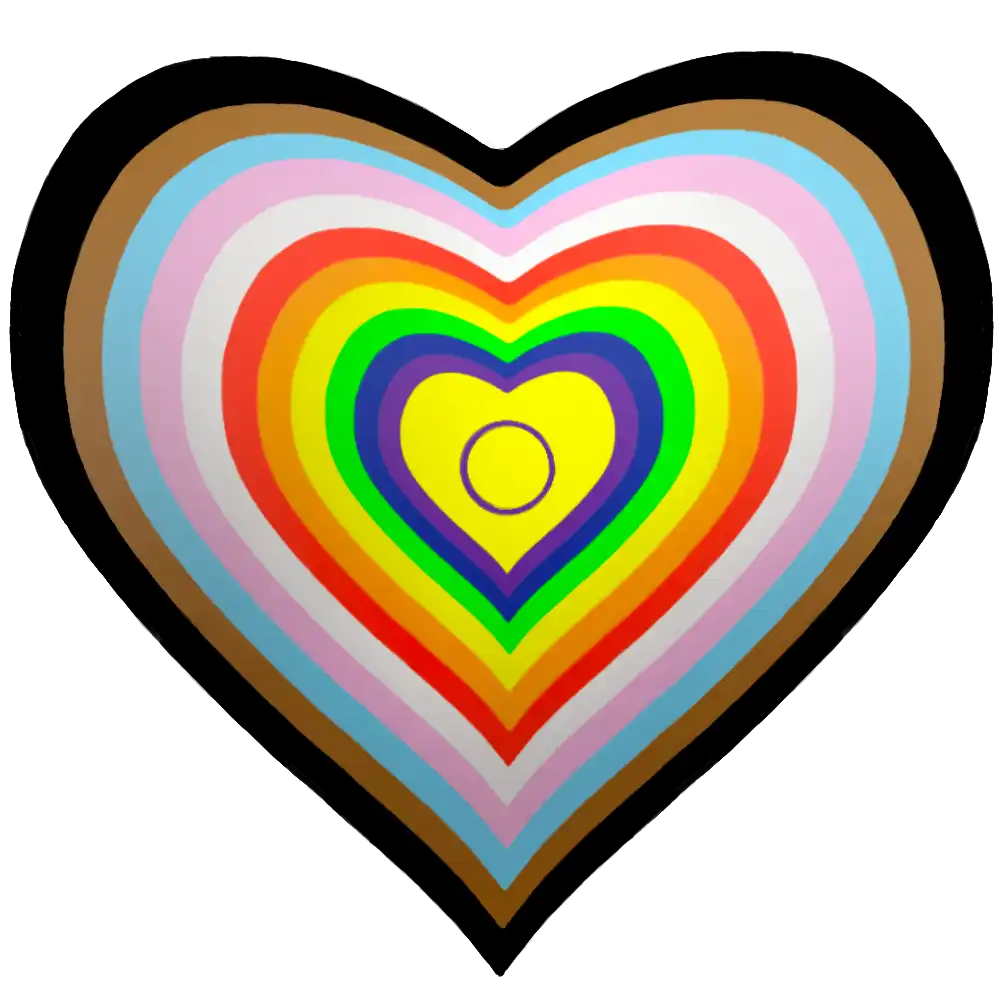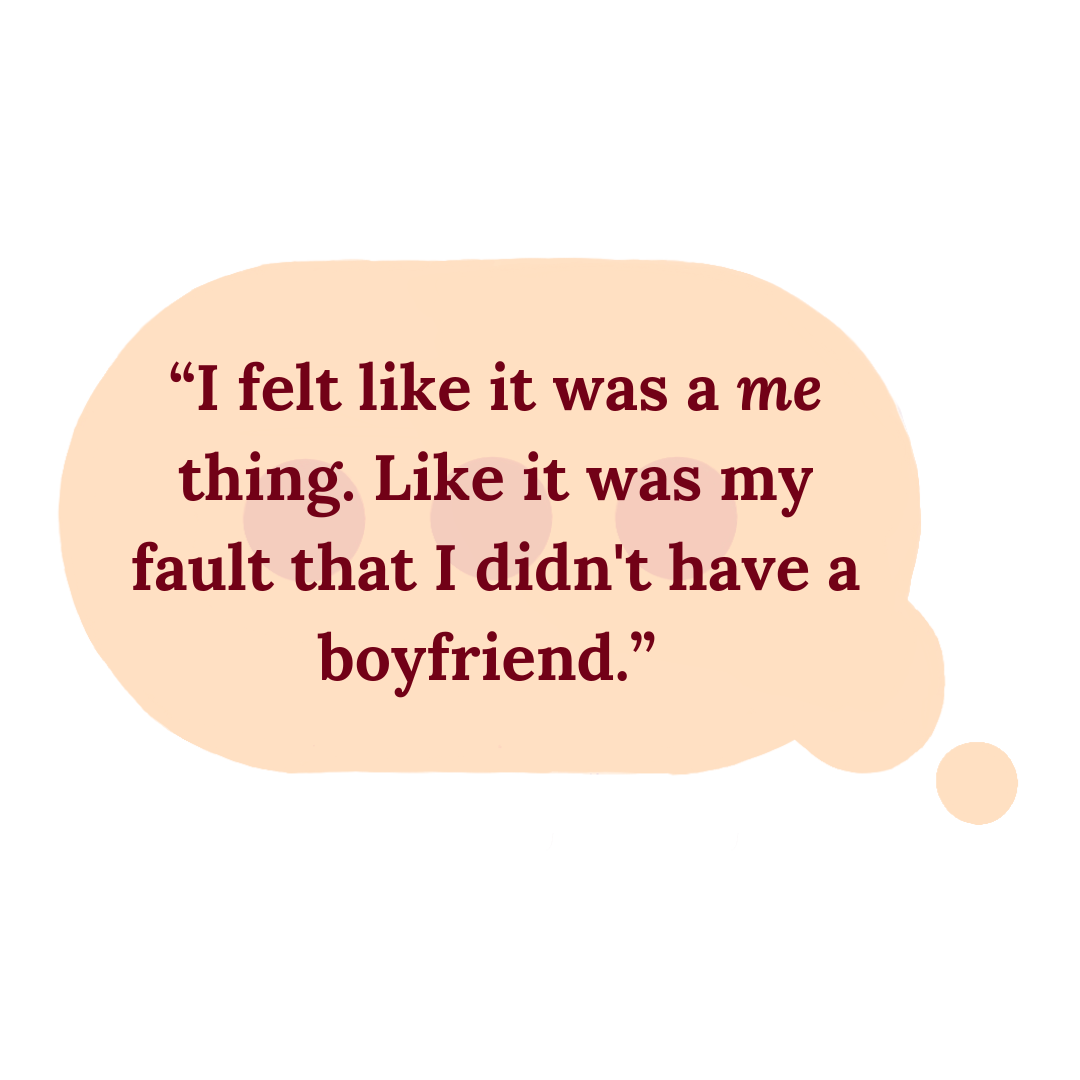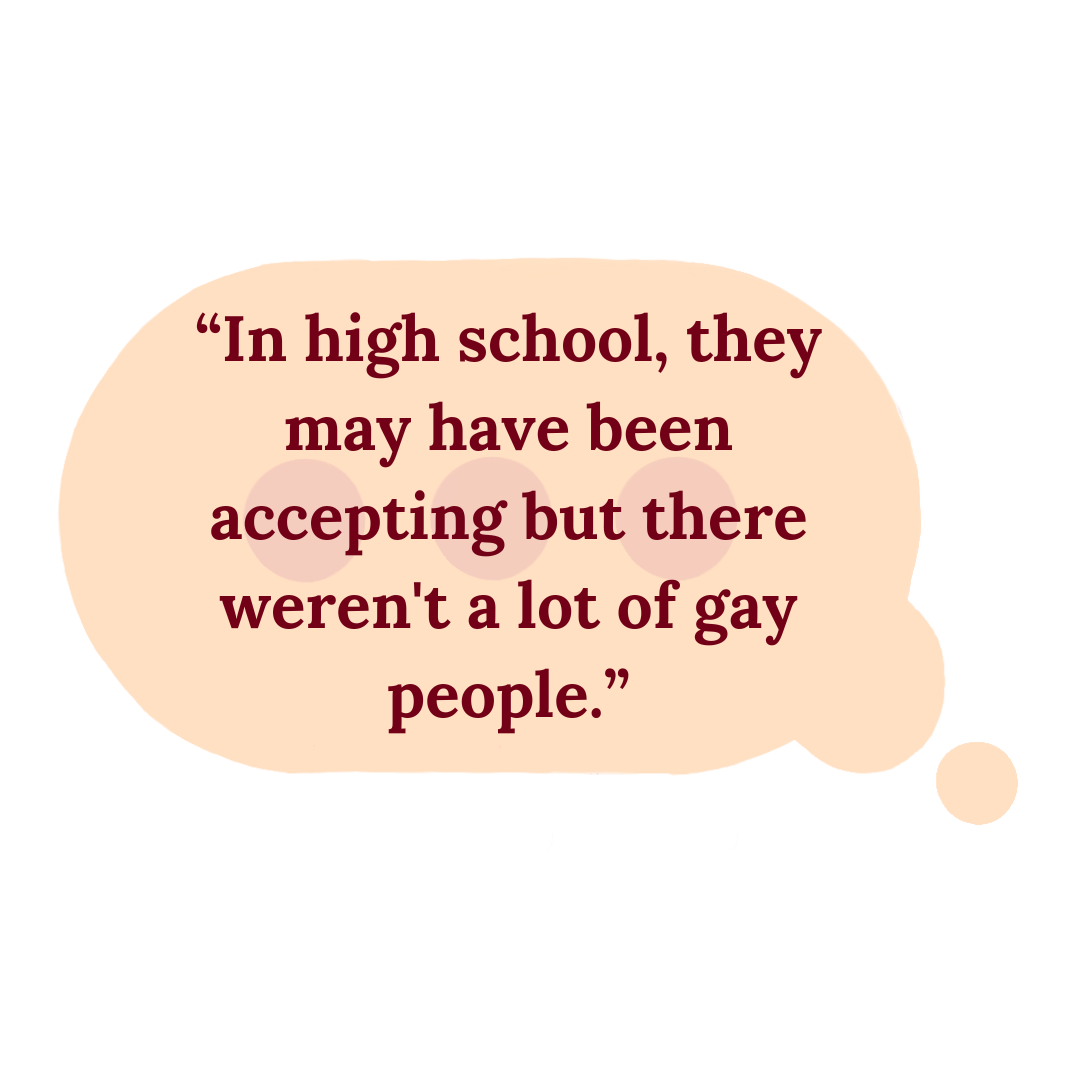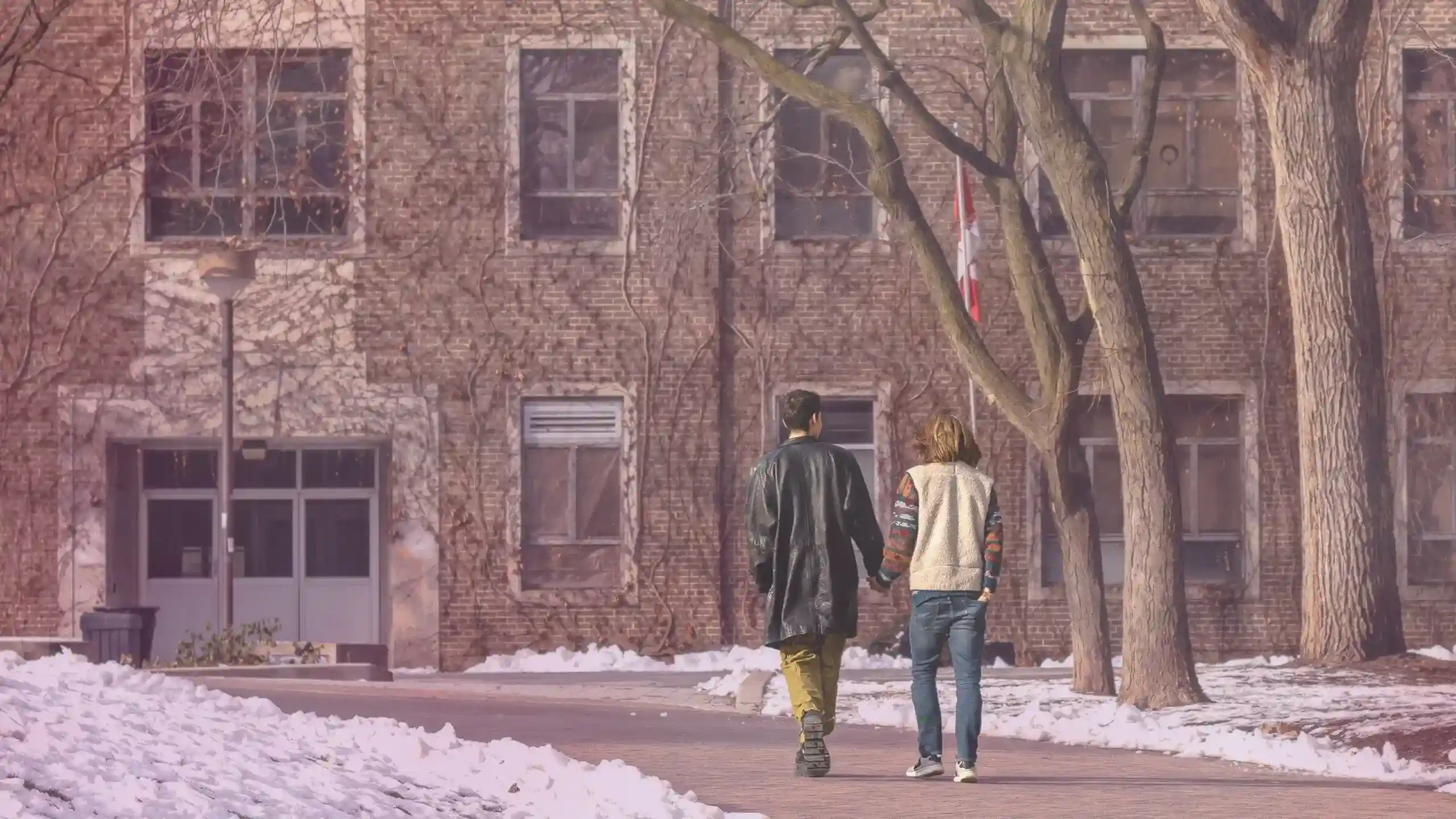Michael Lawson* remembers the tension leading up to the moments before he went to the dentist’s office to get his wisdom teeth removed. It was a hot day in August of 2017, the summer between Grade 10 and Grade 11. He was with his mom and aunt and he remembers specifically telling them not to believe anything he said until the laughing gas wore off. Lawson was worried he was going to tell them he was gay and he hadn’t come out to them yet.
But on the car ride home,while he was still feeling fuzzy from the laughing gas, Lawson accidentally let it slip out.
There was a slight, brief moment of anxiety.
And yet, within an instant, everything was okay—he remembers both his mom and aunt telling him that it was okay and to just close his eyes.
“I knew they were accepting but I remember crying really hard because I just felt this huge weight lifted off my chest," says Lawson. "It was a really cool moment because they didn’t really make a big deal out of it."
He says he was welcomed and accepted by his friends when he came out to them before Grade 9 and by his immediate family when he slowly started openly identifying as gay in Grade 11. Sure, there were a few mean people but he was never really faced with a lot of outwardly malicious treatment. He describes his younger, high school self as someone who was outgoing, friendly and excited to meet new people.
The part that was hard, Lawson says, was the fact that there were hardly any other people like him who were also openly out.
“Even if I did have friends to talk to, most of them were girls, so none of them really understood exactly where [I was] coming from,” says Lawson. He says he didn’t really have anyone who understood what it was like to navigate dating in high school from a gay guy’s perspective.

During a time when a lot of young people start to explore an overwhelming wave of intense, complex feelings and experience many firsts, Lawson says he felt as though he was left watching from the sidelines. He’d seen so many of his friends get into relationships and experience the rush of a “first love.”
He remembers feeling happy for his friends when they would experience their first kisses or their first dates. At the same time, he remembers really wanting to experience that same feeling too.
“I felt like I needed to have a boyfriend because that's what all of my friends were doing,” says Lawson. “They all had boyfriends. And I didn’t have one yet.”
As he watched more of his friends get into relationships, he was left wondering why it wasn’t happening for him yet.
“I felt like it was kind of like a me thing. Like it was my fault that I didn't have a boyfriend.”
For most of his high school years, Lawson had a clear idea of what he was looking for in a partner and a relationship—he just never really had the opportunity to date, nor was he comfortable with putting himself out there. Sometimes, he’d even find himself in situations where the guys he would be speaking to were unable to be openly queer.
“I was kind of in a difficult position because I felt [like] in high school I was accepting of myself but I didn't know if others were ready to be accepting of themselves yet,” says Lawson.
It’s a concept that’s as old as time itself– the thrill of young love and its relentless power. It is ingrained in the movies we consider classics, the novels we study in school and the music that stands the test of time. Many of the pillars of Western pop culture are built upon grandiose, passionate stories of young lovers with larger-than-life romantic gestures that defy the laws of logic, space and time.

For a lot of young, queer people, however, the rush of a first romance looks a lot different than what is shown in the movies. Instead of experiencing the hand-holding in high school hallways or the nervous goodbye kisses before classes start, young 2SLGBTQIA+ people are often left in the dark to navigate the turbulence and rush of a first romance on their own.
It would be hard not to feel that way when you rarely see yourself represented in the movies and real-life relationships around you.
After all, regardless of sexuality, the desire to be known, wanted and embraced wholly– romantically or otherwise—is an inherent part of being human and of being alive.
TMU professional communications professor Zorianna Zurba, whose work involves studying romance in media and the philosophy of love, describes a first love as a monumental part of any person’s life.
“I think it can be really easy to overlook the magnitude of being accepted for who you are and finding someone who is attracted to you based on an identity that you've created for yourself,” says Zurba.
Unsurprisingly, for a lot of queer students, entering Toronto Metropolitan University (TMU),with its location in the heart of downtown Toronto—one of the
most diverse and
highly populated areas in Canada—opens up the floodgates for opportunities for queer students to experience their firsts for the first time. The exposure to an overwhelming number of new people, ideas and environments offers a lot of young queer students the potential to explore their sexualities and identities in ways they didn’t really have the option to earlier in life.
According to a
2012 study from Wright University, which surveyed 159 gay and lesbian college students, university campuses generally tend to be accepting and welcoming environments. There is a kindness that, for a lot of queer students just finishing high school, is new and profound.
The freedom, the exposure to new people, to nightlife, clubs, dating apps—being able to navigate a life outside of the confines of high school, opens up an entire world of possibilities, potential and new experiences for queer people to experience romance.

First-year chemistry student Livia Whynott remembers the cool, crisp October afternoon in 2015 when she came out to her mother as bisexual. She was in Grade 6 at the time and her mother had just picked her up from school. As she sat in the passenger seat of her mother’s car while they waited on the corner of Confederation and King streets in Mississauga, Ont., Whynott remembers saying, “Mom, I like boys and girls.”
There wasn’t even a brief moment of pause or hesitation before her mom responded with a nonchalant “Okay,” before continuing to ask about her day.
Whynott says she had anticipated a reaction like this; she had just started openly identifying as queer to her teachers and peers and knew her mom was not homophobic or unaccepting of the 2SLGBTQIA+ community.
And yet for some reason, the calm, almost indifferent response from her mother was still so profoundly meaningful to her. Today, at 18 years old, she says her mom’s simple “Okay,” has grounded her. It made her feel as though it really wasn’t a big deal. It just was and will continue to be, one of the many parts of who she is.
Similar to Lawson, while Whynott had experienced her fair share of bullying and teasing from her peers when she first came out, by the time she started high school, she was comfortable in her own skin and found a solid, tight-knit group of friends who accepted, understood and welcomed her.
But because she was one of the only few openly queer kids at her 600-person high school in suburban Mississauga, finding herself in a queer relationship was unsurprisingly challenging.
“In high school, they may have been accepting but there weren't a lot of gay people. So there weren't a lot of people to choose from,” says Whynott.

So when she found herself newly single in 2023, after ending a three-year relationship with her boyfriend in the autumn of 2022, she embraced the opportunity to start dating women with optimism. Starting a new phase of her life as a university student was significant for Whynott as she came into her own as a young adult but also in her journey exploring her identity and sexuality as a young queer person.
“I felt like a fake bisexual for a long time,” says Whynott. She says her decision to end her previous relationship so that she would be able to explore her sexuality, her gender identity and herself—something she feels she has more opportunity to do now since starting university.
This has been especially powerful for her as she began exploring her gender identity and expression as a gender fluid person—another facet of the queer experience that can sometimes still be misunderstood. She says being a non-binary person in what seemed to be a predominantly straight high school was where she had the most difficulty.
“I'm so femme-presenting that if I tell somebody that I feel more masculine, they won't believe me,” says Whynott. “They won't accept it or they won't understand it.”
And it’s true—a
2021 study from the
Journal of Pedagogy, Culture & Society found that there are still virtually no supports available to non-binary students in high school. Hardly any academic research even exists on what the non-binary high school experience is like. During a time like high school, when young people are trying so desperately to find themselves without straying too far from the norm, non-binary students are left to feel simultaneously neglected and alienated.
So for Whynott and many others like her, being surrounded by thousands of different students every single day at TMU has granted her a sense of freedom. She knows that for every non-accepting person she may meet, there are going to be many more students who understand her.
“I find comfort in the fact that nobody knows me here,” she says. It’s a stark contrast from high school, where everyone knew each other’s whereabouts at all times and rumours would spread within a matter of hours.

“I can be a guy one day and I can be a girl one day and nobody's gonna care. They'll probably think there's two different people,” says Whynott. “So I find comfort in the fact that I have friends, but also that nobody gives a shit about me. I'm just another face in the walk.”
The feeling of being free to safely explore sexuality and gender in university also rings true for those students in the queer community who come from unsupportive or oppressive backgrounds, says TMU queer media professor Andrea Houston.
“There's quite a few students who are obviously international students who come from countries where it's dangerous to be queer, it's dangerous to put yourself out there. Some even come from countries where it's still a crime to be gay…” says Houston.
She says that LGBTQ+ spaces and groups at universities like TMU, as well as the nearby Church Street community, serve as important structures for international queer students, especially if they come from countries with anti-gay laws.
For many students, university can also be an escape from unaccepting family or relatives—a circumstance that is unfortunately far too common in the queer community. Houston added that it could be devastating to young people to have to hide such an integral part of themselves.
“ I can't imagine too many things that are more destructive on a person, especially a young person, than that,” says Houston.
But at the heart of it, starting university is nothing short of liberating for many queer students.
Houston says at campuses like TMU, many students are also exposed to queer history for the first time in their lives. For queer students, learning the background of how the 2SLGBTQIA+ community came to be can also be incredibly powerful.
“All of that comes because of other young people who did it for you. Who opened up the doors. So that these acts of liberation and these acts of freedom could happen,” she says.
Being exposed to queer education and taking it all in is exceptionally affirming and liberating, says Houston.
Alongside the massive amounts of new students that constantly flow through campuses like TMU, the internet and its inescapable reach has also become an essential part of connection and discovery. A
2013 study from the
Journal of Gay and Lesbian Mental Health found that online spaces can create a safe environment for 2SLGBTQIA+ people to interact with resources, education and each other without the stigma or barriers that exist offline.
This same sentiment can be applied to dating apps. A
2017 study from Rowan University in New Jersey found that the number of 2SLGBTQIA+ users on dating apps is significantly higher than heterosexual ones. It’s the idea of knowing that you are talking to someone who is looking for the same thing as you and that you are safe in assuming that you are talking to someone who is queer without a doubt.

Being queer herself, this is something that resonates with Houston deeply. Obviously flirting isn’t something that comes naturally to everyone but for the most part, straight people are able to flirt while assuming the other person is also straight—a luxury that isn’t really afforded to queer people.
“I think for queer people especially, there's some fear there—maybe you're not going to talk to the right person. What if you flirt with somebody who maybe isn't as supportive of LGBTQ diversity?” says Houston. “That's a concern as well that young people absolutely have, and with good reason.”
Whynott says she’s in the process of setting up her first-ever date with a girl. She matched with her on Tinder and they’ve been chatting online for a few days now. She found out that, coincidentally, they both live in the same building, just a few floors apart. She smiles as she says that this would be one of the first times she’s felt a real connection with a girl and how excited she is to pursue it.
“I couldn't have imagined this a year ago, being in high school. I couldn't imagine talking to a woman. And now that I actually am and we have a date planned, I'm really excited for it. So it's really sweet. And for the first time, I can,” she says.
Whynott says that although she is quite comfortable in her own skin, she is very shy when it comes to romance. The process of actively pursuing someone is something she has never really experienced before.
“It’s going to be something new and something exciting. So I’m really excited for it,” she says.
She giggles as she jokes about the prospect of getting her heart broken or dumped, saying it’s “about time karma got to her” but there is a sense of resilience there, too.
She’s excited to be able to freely date and explore her identity as a queer person and she braces herself for all the possibilities—good and bad—with optimism and a smile.

There is a sense of sweetness and relief when Lawson talks about how he’s grown over the past few years post-high school.
As a teenager, he remembers feeling disappointed about his lack of romantic experience. He was someone his friends would turn to for advice or share stories with but he was never really able to experience it with somebody himself.

There is a lot of happiness and fondness in his voice as he mentions how he’s in the beginning stages of a new relationship.
Lawson was a little nervous to go on his first date with his now partner—the two had met online and were set to meet up at 168 Sushi. He says they arrived as soon as the restaurant opened and they were the first two customers for a little while.
As their date progressed—and the noodles and sushi rolls were being delivered to their table—he felt totally comfortable. They shared the same interests and their conversations felt natural.
“We both promised ourselves that we would go to class after but we ended up having such a good time that we decided to skip it,” says Lawson.
It’s been five months since their first date and Lawson says he’s very happy about the pace they’re moving at. This is something that he feels he wouldn’t have been able to do when he was still in high school. Back then, when he was experiencing an overwhelming surge of feelings for the first time, sometimes everything felt so profoundly all-or-nothing. It was hard not to go into romantic encounters full-force, he says.
He feels as though he’s matured a lot since high school and through being with his current partner. There’s a whole, genuine care for one another that reaches far deeper than surface-level attraction, says Lawson.
By taking it slow, Lawson realizes the authentic connection he has with his partner. They’ve been able to take the time to really understand each other and their relationship, making the wait worthwhile.
“I'm really happy to be in [this relationship] because I wouldn't want to be with just anybody… I'm just happy that I took my time and took it slow,” he says. “I found somebody that I actually want to be with. I'm pretty proud of myself that I'm not as dependent on wanting a guy.”
Knowing what he knows now, Lawson wishes he could tell his younger self to take a breath and take his time.
“Going super slow doesn't necessarily mean that the person isn't into you, it just means that it's better to take slow steps and be sure of where you are,” he says.
“That's what I’d tell myself: Just put yourself out there more if you do want to talk to guys but don't feel like you have to.”
*Source’s name was changed for privacy reasons






